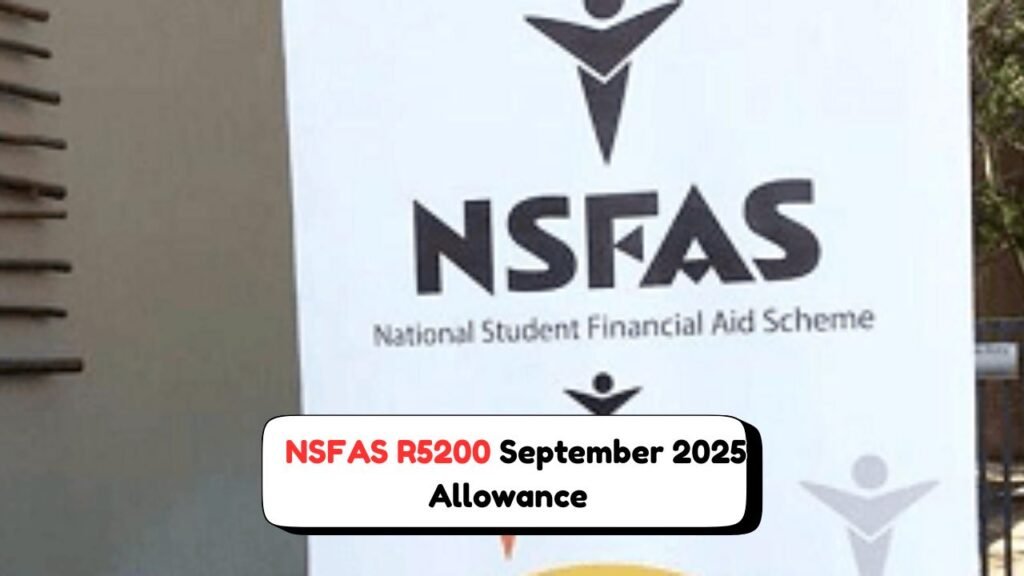Secure Your R5,200 NSFAS Allowance: National Student Financial Aid Scheme (NSFAS) beneficiaries in South Africa are racing against time to secure their R5,200 monthly allowance before the impending September deadline. This crucial financial aid has been a lifeline for many students, enabling them to cover essential academic and living expenses. Missing the deadline could result in significant disruptions to their educational journey. With the deadline approaching, students are urged to ensure all necessary documentation is submitted, and any outstanding issues are resolved promptly. This allowance is vital for maintaining their academic focus and ensuring their success in higher education.

Understanding the Importance of the R5,200 NSFAS Allowance
The R5,200 NSFAS allowance plays a pivotal role in supporting the educational endeavors of hundreds of thousands of students across South Africa. This allowance not only helps in covering tuition fees but also aids with accommodation, study materials, and daily living expenses. For many, it is the difference between continuing their studies and having to drop out due to financial constraints. The urgency of securing this allowance cannot be overstated, as it directly impacts their ability to focus on academics without the added stress of financial uncertainty. In a country where education is a key driver for economic mobility, this financial support is essential for leveling the playing field and providing equal opportunities for all students, regardless of their socio-economic background. Therefore, understanding and adhering to the deadlines set by NSFAS is crucial for students to maintain their academic momentum and pursue their dreams.
Steps to Take Before the September NSFAS Allowance Deadline
As the September deadline for the NSFAS allowance quickly approaches, there are several steps students should take to ensure they receive their financial aid without delay. Firstly, it is essential to verify that all personal and banking details are up-to-date on the NSFAS portal. Any discrepancies in information can lead to delays in disbursement. Secondly, students should ensure that they have submitted all required documentation, such as proof of registration and academic records, as these are critical for the processing of the allowance. Additionally, keeping an eye on communication from NSFAS, whether via email or SMS, is important to stay informed about any changes or additional requirements. Lastly, engaging with campus financial aid offices can provide clarity and assistance in navigating the application process, ensuring that all queries are addressed promptly. By taking these proactive steps, students can avoid the stress of last-minute hiccups and secure their much-needed financial support.
Common Challenges in Receiving NSFAS Allowances
Despite the significant benefits of the NSFAS allowance, students often encounter challenges in receiving their funds. One of the most common issues is the delay in the verification of documents, which can stall the disbursement process. This is often due to high volumes of applications being processed simultaneously, leading to bottlenecks. Another challenge is the incorrect submission of banking details, resulting in funds being directed to the wrong accounts or being delayed. Students also face difficulties due to changes in academic status, such as dropping courses or failing to meet academic requirements, which can affect their eligibility for continued funding. To mitigate these challenges, it is advisable for students to maintain regular communication with NSFAS representatives and to promptly address any queries or discrepancies that arise. Staying informed and proactive can significantly reduce the likelihood of encountering these common obstacles.
How to Maximize the Benefits of Your NSFAS Allowance
Maximizing the benefits of the NSFAS allowance requires strategic financial planning and prudent management of resources. Students should begin by creating a budget that prioritizes essential expenses, such as tuition, accommodation, and study materials. Allocating funds for daily living expenses, including food and transportation, is also crucial. It is important to differentiate between needs and wants; avoiding unnecessary expenditures can ensure funds last throughout the academic term. Additionally, students are encouraged to explore part-time work opportunities that can supplement their allowance without compromising their studies. By developing financial literacy skills, students can learn to save and invest any surplus funds, providing a financial cushion for unforeseen expenses. Ultimately, maximizing the NSFAS allowance involves a balance of disciplined spending, saving, and investing, all of which contribute to a sustainable and successful academic experience.




